Can a card game without any lasting rules be fun? Read Tom’s review and see if Fluxx is for you!
When I was a kid, some of my favorite gaming experiences involved playing Gin Rummy with my grandmother. She taught me how to play when I was five years old and we would play any time she’d come over to babysit. I even learned how to shuffle a deck of cards solely to impress her. (And, yes, she was impressed.)
Since then, I’ve come to look at a deck of cards less with a sense of nostalgia, and more as a static, predetermined series of events. Once shuffled, regardless of the possible number of permutations*, a deck becomes a fixed series of options. Even skilled players can only guess at how to best interact with it. For me, playing a game with this mechanism feels futile. With the card order set in place, thinking I could have any influence over the outcome feels absurd.
Bluffing games aside, I tend to approach a deck of cards with the same reluctance that I save for six-sided dice. That is to say, I need to trust you a lot to consider playing it.
The Abstract Gamer in me craves open information and zero luck. For me, the fickle whims of fate makes for a non-game, an exercise in Why Bother and Who Cares.
All of which brings me to Fluxx.
How to Play
The initial rules of Fluxx are wonderfully simple.
Take the 100 cards of the standard Fluxx game and find the Basic Rules card. Place it in full view of all the players.
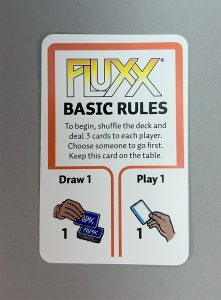
Shuffle the remaining 99 cards and deal three cards out to each player.
As the Basic Rules state, on a turn, each player draws one card from the deck and then plays a card from their hand.
These cards are made up of 32 Goal cards, 22 Keeper cards, 22 Action cards, and 23 New Rule cards.
Got that? Great!
To explain a bit further:
- Goal cards show the Keeper card combinations required to win the game. Until someone plays a Goal card, there is no way to win the game–although with so many Goal cards, the goal is likely to change repeatedly throughout the game. (Even multiple times in a single turn!)
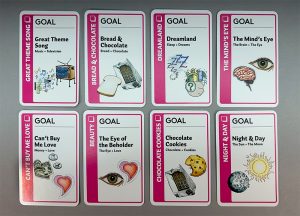
- The right Keeper cards need to be played in front of you to win the game. Again, the required Keeper cards will change as the Goal card changes. Initially, there is no limit to the number of Keepers you can have in front of you.

- Action cards provide you with a one-time special action on the turn you play them. These range from drawing and immediately playing two cards from the deck, to having everyone pass their cards to another player, to shuffling all the Keepers in play and redistributing them randomly to the players.
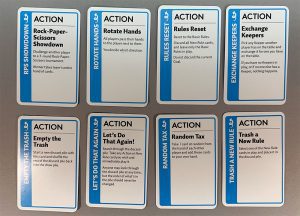
- New Rule cards expand on the initial ‘draw one, play’ one rule. Examples here are being able to draw the top card of the playing deck and playing it immediately as a free action, drawing four cards, playing all cards in your hand but one, or limiting the number of Keepers in front of you to four.
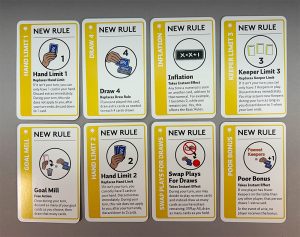
Players take turns, drawing and playing however many cards are required by the current rules, until someone has the Keepers in front of them that match the current Goal card.
Thoughts
People I’ve spoken with who have played Fluxx tend to either love it or hate it. I’ve met very few people who were meh about it. With the continual change in winning conditions, cards in hand and cards that can be played, it can be a chaotic mess if you’re not open to the fickle whims of fate that I mentioned earlier.
Which is why many of my friends are surprised when I tell them I love Fluxx.
I’m not just saying this because I grew up not far from where Fluxx publisher Looney Labs has their headquarters. Nor is it because I’m a big fan of designer Andrew Looney’s Pyramids gaming system. I say this because, for me, Fluxx takes the absurdity of most pre-ordained outcomes of a set deck of cards and turns it on its head.
It’s common for the rules and goal of the game to be different from one turn to the next. In fact, as with Calvinball, in Fluxx,the only constant is change.
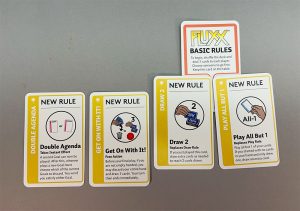
I get why the capricious nature of Fluxx can turn some people off. With so many elements of the game subject to change on any given turn, it can be difficult to adopt a winning strategy–or any strategy, for that matter.
But here’s the thing for me: Fluxx is more about the players than the game itself. With the right people, Fluxx is a blast to play. Players start smiling when they look at their cards and realize how they can alter the game on their turn, sometimes (hopefully) to their advantage, other times just for the sake of changing the game.
The people I’ve played Fluxx with for the first time who have gotten the frenzied transmogrification that is the game have really enjoyed it. Most often, they ask to play it again right away, eager to see the cards that they didn’t get a chance to play in the first game.
If Fluxx sounds intriguing, take a look at the Looney Labs Fluxx page where you’ll find 30 different versions of Fluxx (and counting!). Chances are good you’ll find one that interests you and/or your family or playing group.
_____________________________
* In case you were wondering how many different combinations a standard deck of 52 cards can be shuffled into, the answer is 80,658,175,170,943,878,571,660,636,856,403,766,975,289,505,440,883,277,824,000,000,000,000. You’re welcome.


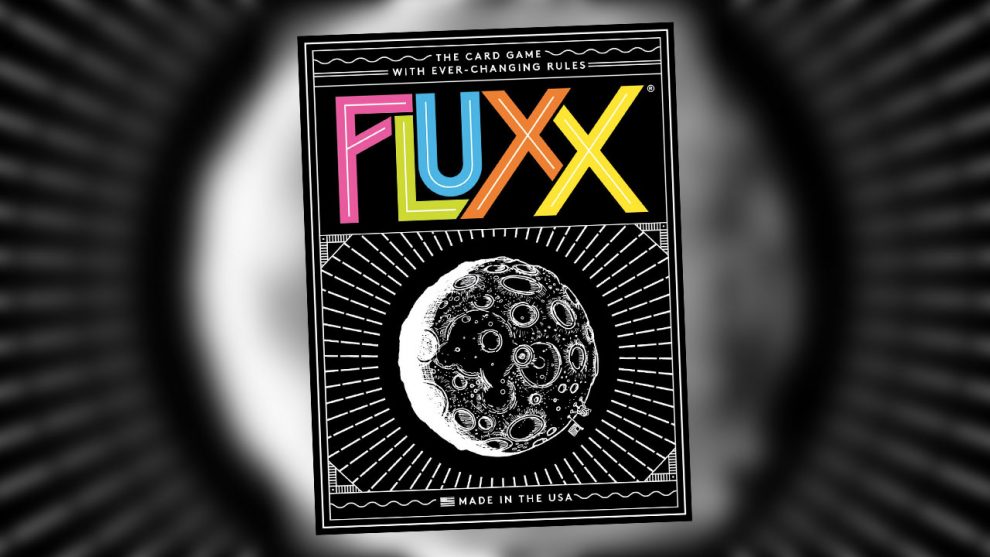


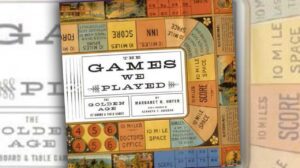






Add Comment